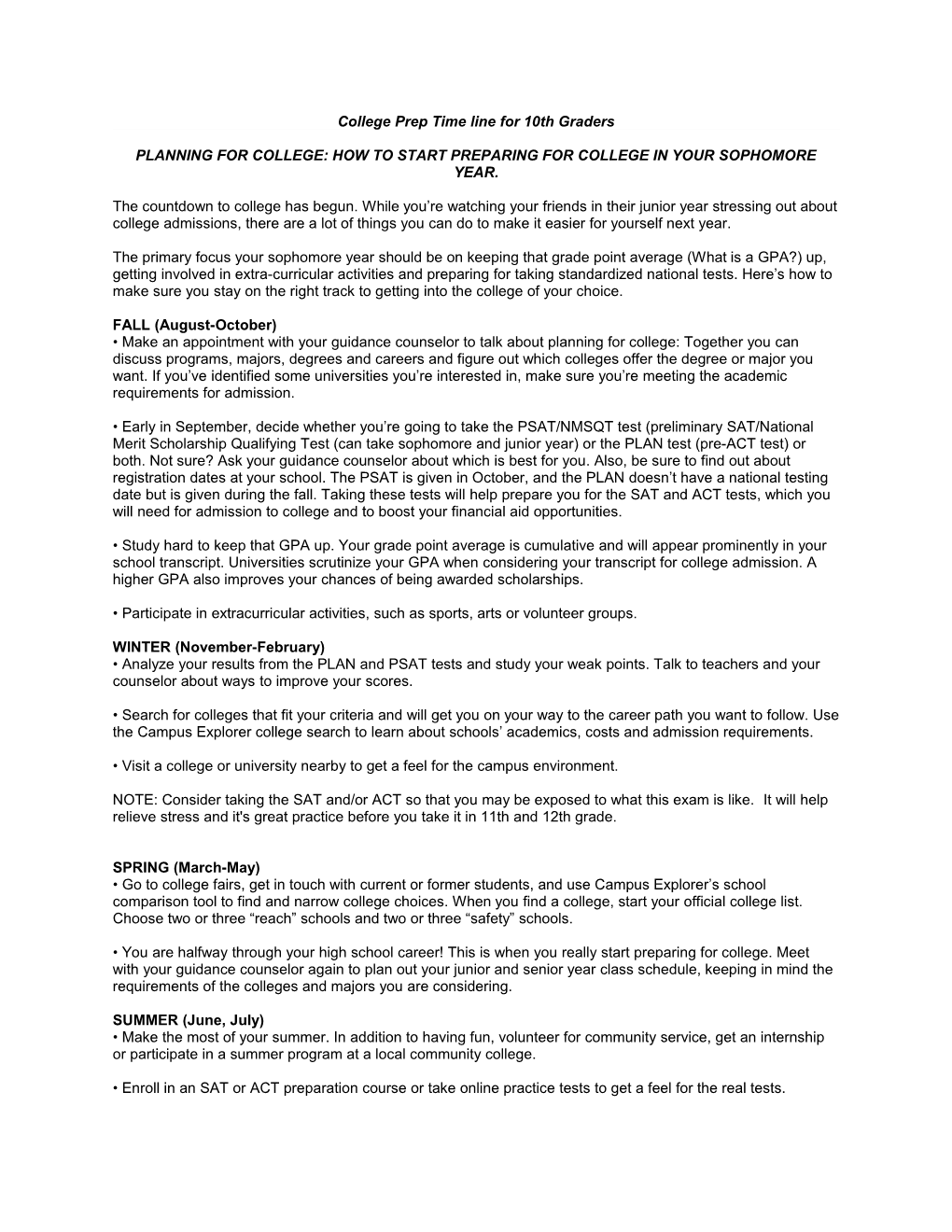College Prep Time line for 10th Graders
PLANNING FOR COLLEGE: HOW TO START PREPARING FOR COLLEGE IN YOUR SOPHOMORE YEAR.
The countdown to college has begun. While you’re watching your friends in their junior year stressing out about college admissions, there are a lot of things you can do to make it easier for yourself next year.
The primary focus your sophomore year should be on keeping that grade point average (What is a GPA?) up, getting involved in extra-curricular activities and preparing for taking standardized national tests. Here’s how to make sure you stay on the right track to getting into the college of your choice.
FALL (August-October)
• Make an appointment with your guidance counselor to talk about planning for college: Together you can discuss programs, majors, degrees and careers and figure out which colleges offer the degree or major you want. If you’ve identified some universities you’re interested in, make sure you’re meeting the academic requirements for admission.
• Early in September, decide whether you’re going to take the PSAT/NMSQT test (preliminary SAT/National Merit Scholarship Qualifying Test (can take sophomore and junior year) or the PLAN test (pre-ACT test) or both. Not sure? Ask your guidance counselor about which is best for you. Also, be sure to find out about registration dates at your school. The PSAT is given in October, and the PLAN doesn’t have a national testing date but is given during the fall. Taking these tests will help prepare you for the SAT and ACT tests, which you will need for admission to college and to boost your financial aid opportunities.
• Study hard to keep that GPA up. Your grade point average is cumulative and will appear prominently in your school transcript. Universities scrutinize your GPA when considering your transcript for college admission. A higher GPA also improves your chances of being awarded scholarships.
• Participate in extracurricular activities, such as sports, arts or volunteer groups.
WINTER (November-February)
• Analyze your results from the PLAN and PSAT tests and study your weak points. Talk to teachers and your counselor about ways to improve your scores.
• Search for colleges that fit your criteria and will get you on your way to the career path you want to follow. Use the Campus Explorer college search to learn about schools’ academics, costs and admission requirements.
• Visit a college or university nearby to get a feel for the campus environment.
NOTE: Consider taking the SAT and/or ACT so that you may be exposed to what this exam is like. It will help relieve stress and it's great practice before you take it in 11th and 12th grade.
SPRING (March-May)
• Go to college fairs, get in touch with current or former students, and use Campus Explorer’s school comparison tool to find and narrow college choices. When you find a college, start your official college list. Choose two or three “reach” schools and two or three “safety” schools.
• You are halfway through your high school career! This is when you really start preparing for college. Meet with your guidance counselor again to plan out your junior and senior year class schedule, keeping in mind the requirements of the colleges and majors you are considering.
SUMMER (June, July)
• Make the most of your summer. In addition to having fun, volunteer for community service, get an internship or participate in a summer program at a local community college.
• Enroll in an SAT or ACT preparation course or take online practice tests to get a feel for the real tests.
• Get a summer job. In addition to helping you save money for university, a job will build your leadership skills and teach you more about the types of majors and jobs you’re interested in.
• Visit colleges to see what types of schools appeal to you.
SOPHOMORE YEAR COLLEGE PLANNING TIPS & TACTICS
• Keep a calendar of all of your deadlines and test dates.
• Make sure you’re taking all the required courses you need for college. Many top four-year colleges prefer your high school education to include classes in English, math, science, social studies and foreign language all four years.
• Evaluate your extra-curricular activities, keeping in mind that quality is more important than quantity. Schools evaluate how you spend your free time to see that you’ve made a meaningful contribution and a long-term commitment to an organization, cause or hobby.
• Keep up your list of all of your awards and extracurricular activities, along with the dates you participated and the names and contact information of people who you might want to ask to write a letter of recommendation for you. Keeping track of all of this information now will make it easier for you to remember during the college admissions process.
